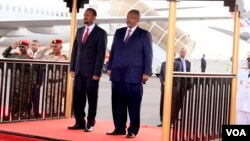Ethiopia's new prime minister, Abiy Ahmed, began his first trip outside his country Saturday to Djibouti, a small but strategic country on the Red Sea.
During Ahmed's 48-hour stay in Djibouti, he was scheduled to participate in talks on security, trade and improving the neighboring countries' strategic interests, Djibouti officials said.
Ahmed was sworn in as Ethiopia's prime minister at the beginning of April, replacing Hailemariam Desalegn, who resigned unexpectedly in February.
Leading a large delegation that included ministers, Ahmed was received by Djibouti President Ismaïl Omar Guelleh at Ambouli International Airport.
A VOA reporter at the scene said Ethiopia's foreign minister, Workneh Gebeyehu, and the Ethiopian Somali Region president, Abdi Mahamud Omar, were among the delegates at the airport.
The leaders went to the statehouse for a dinner following the arrival.
Challenging situation
Ahmed's visit comes amid a host of challenges inside Ethiopia, where he inherited a country riven by years of protests by people who feel marginalized and a government accused of gross human rights violations.
On the positive side, he has taken the reins of a nation with one of the fastest-growing economies in the world.
Djibouti, close to restive regions in Africa and the Middle East, is home to several foreign military bases, including those run by the U.S., France and Japan. China also is constructing its first overseas military base there, just a few miles from Camp Lemonnier, one of the Pentagon's largest and most important foreign installations.
Beyond Ethiopia's strategic interests with Djibouti, the two countries have shown great interest in fostering regional economic integration. They are highly interdependent.The Port of Djibouti is the only maritime facility for the landlocked country of Ethiopia.
Those interests have been boosted by the establishment of a Chinese-built, 756-kilometer electrified rail project, which officially started operations this year.




